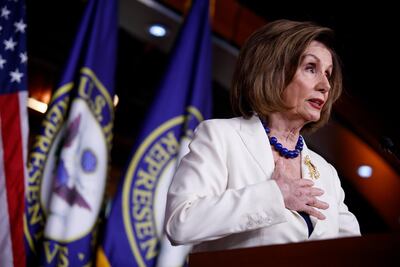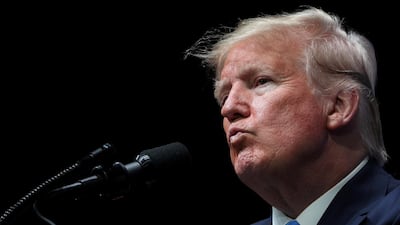Two weeks ago, I warned that the Democratic Party was making a big mistake by rushing to pass articles of impeachment in the House of Representatives and force a Senate trial of US President Donald Trump. The intervening days have greatly expanded the number of analysts agreeing that Democrats are mishandling the process of trying to hold Mr Trump accountable for allegedly trying to leverage US foreign policy to smear his political opponents.
Three major recent developments intensified these concerns.
First, important facts continue to come to light, including further evidence that the Ukrainian government was well aware of the withholding of US aid – through which Mr Trump allegedly sought to pressure Kiev to announce an investigation into unsubstantiated corruption claims against Hunter Biden, the son of his leading Democratic rival Joe Biden. There is also new evidence that Mr Trump and his associates had extensive telephone conversations most probably dedicated to this caper.
Second, Democrats have accelerated their rush towards impeachment by the House of Representatives possibly before Christmas.
Third, the baton has been passed from the house intelligence committee to the judiciary committee, which would adopt and forward impeachment articles to the full house.
The judiciary committee held its first hearing last week featuring four constitutional scholars. Three advocated impeachment with potent legal and analytical arguments. However, the fourth, Jonathan Turley, had warnings for both sides.
Although called by Mr Trump's Republican allies, he did not support their main arguments. He agreed that Mr Trump might well have committed impeachable offenses, most notably during his July 25 phone call with Volodymyr Zelenskiy, the Ukrainian president, which he said was "anything but ‘perfect’," as the president insists.
Most Republicans have dismissed the inquiry as a ridiculous waste of time. By contrast, Mr Turley argued that the Democrats can and should increase their efforts to develop the case. His legal arguments seemed weak compared to those of his colleagues. However, his political point that the general public has not been convinced and that much more testimony and documentation is required for impeachment to make sense was powerful.
His claim that by not suing for such testimony in court, Democrats are abusing their power is hugely overblown. But they are certainly abandoning the institutional imperative to re-establish the US Congress's authority to compel testimony and obtain documents despite Mr Trump's unprecedented stonewalling.
The White House has refused all congressional requests for documents and ordered all executive branch employees not to testify, although several have anyway.
But crucial testimony is required from acting White House chief of staff Mick Mulvaney and his aide Robert Blair, energy secretary Rick Perry and his former chief of staff Brian McCormack, secretary of state Mike Pompeo and his counsellor Ulrich Brechbuhl, defense secretary Mark Esper, national security council lawyer John Eisenberg and his deputy Michael Ellis, various officials from the office of management and budget, and, most notably, former national security adviser John Bolton (who has suggested he is aware of lots of undiscovered information about the Ukraine scandal).

Democrats have not subpoenaed most of these officials for fear of endless litigation, though there are potential ways around that pitfall.
It is also essential that they confront and defeat a series of interconnected claims being made by the White House that essentially place the president above the law. The administration claims the president not only cannot be charged with a crime but cannot even be investigated under any circumstance by any law enforcement authorities, state or federal. It also claims that only the executive, not Congress, can investigate any violations of law. And, finally, it claims the president has "absolute immunity” from congressional investigation and testimony applicable to all current and former employees and to all documents.
If Congress and the courts fail to quash such vast claims of executive impunity, the US will effectively have temporary, elected monarchs and impeachment will be meaningless because establishing the facts will be practically impossible.
The Democrats' haste is especially troubling because it is so evidently political: a prolonged impeachment process does not fit their partisan schedule regarding the primary and general elections in 2020. They do not want their candidates mired in impeachment disputes while they are trying to secure the nomination and win back the White House. But this greatly bolsters the otherwise weak Republican case that this impeachment is essentially a political exercise. Legally, morally and constitutionally, it is not. Democrats have a devastating case against Mr Trump. However, tactically and strategically, it increasingly appears political.
Without the upcoming elections, Democrats would surely be hunkering down for an unyielding struggle to assert the rights of Congress and build the legal and political case against Mr Trump with the general public. And by rushing, Democrats are playing into some of Mr Trump's greatest strengths. He thrives on speed and chaos. One scandal follows so fast upon the next that no one can stay focused and it all becomes a dizzying blur.
If Democrats were serious about impeachment, they would counteract this Trumpian fog of misdirection and information overload with clarity, repetition, persistence and endless amplification of the basic facts that are already established and certainly appear impeachable.
As Harvard professor Noah Feldman noted at the hearing, impeachment is part of the Constitution precisely because its framers feared that “a president might use the power of his office to influence the electoral process in his own favour". That is precisely what Mr Trump appears to have attempted.
This is also the main argument Democrats use to justify their haste: if there is an ongoing corrupt effort to misuse the powers of the presidency to rig the upcoming election, it must be stopped immediately or the results will be tainted forever. They point to the president's private attorney, Rudy Giuliani, continuing to ostentatiously meet with pro-Moscow Ukrainians to promote long-debunked conspiracy theories blaming Ukraine for meddling in the 2016 election.
Such fears are not ridiculous. But they are not sufficient either.
The purpose of protracted hearings would not be, as analyst Michael Tomasky suggested, to simply accumulate more articles of impeachment. It is to ensure that Congress establishes the facts, effectively communicates them to the public and reasserts its indispensable investigative authority.
If all that comes at a significant political cost, Democrats are duty-bound to pay it. Otherwise, it will be hard to counter the argument that for them this is indeed just another political game.
Hussein Ibish is a senior resident scholar at the Arab Gulf States Institute in Washington


